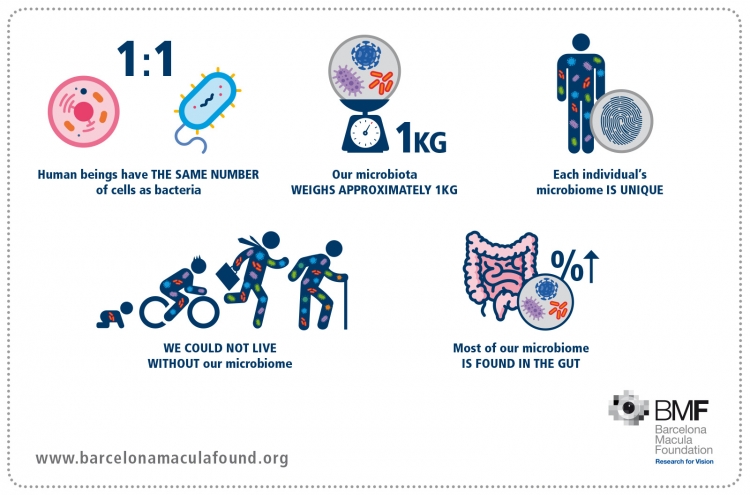The role of the microbiome in eye health

The microbiota is the set of microorganisms (bacteria, fungi, viruses etc.) that inhabit different parts of our body. They live mainly in the gut (between 500-1,000 different species) but also in the skin, vagina or mouth, generating an ecosystem called microbiome. Until a few years ago, it was believed that these small occupants who coexist with us belonged to the plant kingdom and for that reason, for almost a century, we have referred to them as intestinal flora.
Babies begin to impregnate themselves with this microbiota when they are still in the mother’s womb1. Different species will colonise your body at birth and at the start of breastfeeding. As children start feeding, they fall ill, take antibiotics or change their place of residence, these microorganisms will vary in quantity and diversity. And so, throughout life, they will modify the composition of their microbiome2.
Each individual hosts a unique and essential microbiome for life, which will play – in combination with his or her genetics – a key role in both health and disease.
The microbiome participates in processes such as digestion, the production of vitamins, the regulation of inflammatory states and the differentiation between pathogenic and non-pathogenic microorganisms. The immune system and the microbiome maintain a constant dialogue, but when this relationship becomes unbalanced, pathological processes may start.
Genetic predisposition is the probability of developing a certain disease based on a person’s genetic coding. This information with which we are born contributes to the development of a disease but does not directly cause it. Thus, a microbiome affected by factors such as poor diet, uncontrolled taking of antibiotics, tobacco or stress, is unable to prevent individuals genetically predisposed to developing certain diseases4. Similarly, given that the microbiome is potentially modifiable, changes in lifestyle can reduce the risk of suffering diseases in people with a certain genetic predisposition3.
Today, it is known that gut microbiota are related to neurodegenerative diseases such as Parkinson‘s or Alzheimer‘s disease, in neurodevelopmental disorders such as autism spectrum disorder (ASD)5 or in metabolic syndromes such as type II diabetes. In fact, the modification of gut microbiota through the diet can be regarded as one of the objectives for metabolic syndromes (obesity, type II diabetes etc.)
Recent studies suggest that the microbiome may also play an important role in ocular diseases such as uveitis6 or exudative age-related macular degeneration (AMD)7. What has still to be demonstrated in many cases is whether the changes observed in the microbiota are the cause or consequence of the disease.
It is necessary, therefore, to keep researching in order to understand the role of the microbiome in diseases such as AMD, both to understand its mechanism of action and to prevent or personalise treatments. The Barcelona Macula Foundation, in close collaboration with the Institut de la Màcula and the Centre for Genomic Regulation, have designed a study to examine the differences between the microbiome of patients with AMD and healthy subjects and thus continue to contribute knowledge in this field.
Today marks World Microbiome Day, an initiative of the APC Microbiome Ireland #WorldMicrobiomeDay that aims to raise awareness of the important role played by this ecosystem in health. The Barcelona Macula Foundation also supports this objective.
REFERENCES
- Collado, M. C. et al. Human gut colonisation may be initiated in utero by distinct microbial communities in the placenta and amniotic fluid. Sci. Rep. 6, 23129 (2016).
- Stewart, C. J. et al. Temporal development of the gut microbiome in early childhood from the TEDDY study. Nature 562, 583–588 (2018).
- U.S. National Library of Medicine. Mutations and Health. Help Me Understand Genet. (2016).
- Blum, H. E. The human microbiome. Adv. Med. Sci. 62, 414–420 (2017).
- Shivani Ghaisas et al. Gut microbiome in health and disease: linking the microbiome- gut-brain axis and environmental factors in the pathogenesis of systemic and neurodegenerative diseases. Pharmacol. Ther. 158, 52–62 (2016).
- Peña, M. et al. Focos sépticos bucales en pacientes con uveítis. MEDISAN 16, 1852–1860 (2012).
- Zinkernagel, M. S. et al. Association of the intestinal microbiome with the development of neovascular age-related macular degeneration. Sci. Rep. 7, 1–9 (2017).
Author: Míriam Garcia, member of the BMF research team